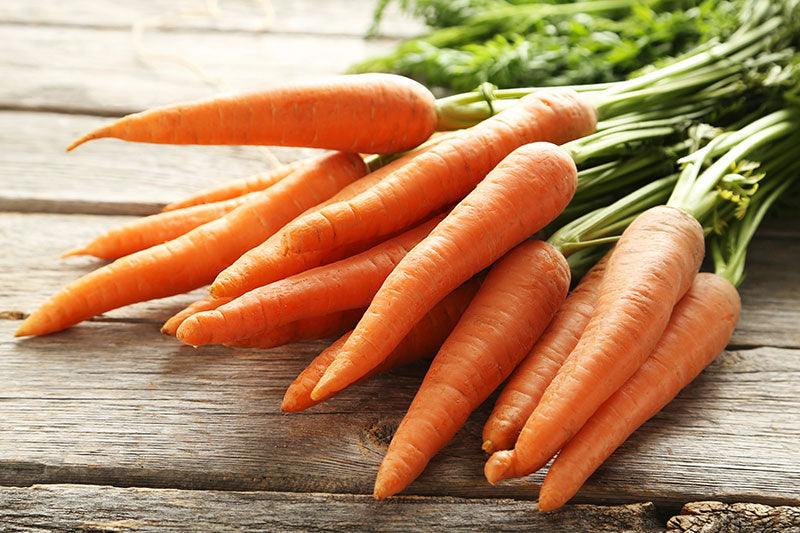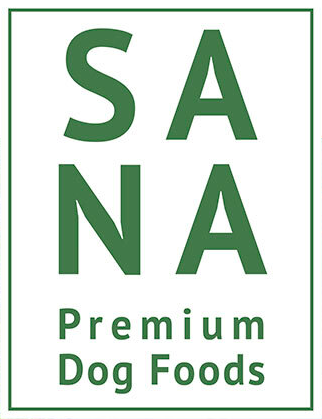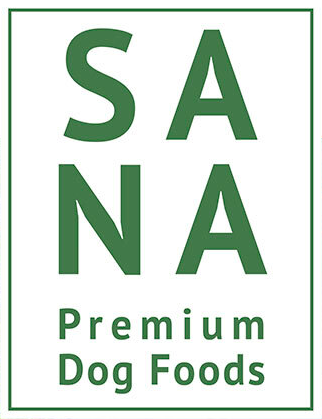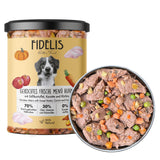6 x Wołowina z słodkimi ziemniakami, jabłkiem i brokułami – w szklanym słoiku
Subcribe to back in stock notification
- Produktinformation
- Co jest w środku i dlaczego?
- Dlaczego w szkle?
- Zalecenia dotyczące karmienia
Nasze „Steak Menu” dla Twojego pupila! 70% soczystej, delikatnie gotowanej wołowiny z chrupiącymi batatami, świeżymi warzywami i pysznymi owocami jako odpowiednia przekąska. Menu dopełnia naturalna minerały, wysokiej jakości olej łososiowy i aromatyczny rozmaryn.
W naszym menu świeżym z wołowiną używamy wyłącznie świeżych składników spożywczych w naszej własnej manufakturze. Wysokiej jakości mięso wołowe i podroby gotujemy powoli i delikatnie w niskich temperaturach. Dopiero potem mieszamy blanszowane bataty, marchew, groszek, brokuły i jabłka, a także olej łososiowy, dziką różę, algi węglanowe, drożdże piwne, mączkę z alg morskich i rozmaryn do ugotowanej karmy. Dzięki temu zachowujemy optymalnie smak i składniki odżywcze.
Brak wysokich temperatur, brak wypełniaczy, brak sztucznych dodatków witaminowych, brak ekstrudowania, brak sterylizowanych puszek. Rezultat: Jak samodzielnie gotowana, zdrowa karma ze wszystkimi składnikami odżywczymi pochodzącymi ze świeżych składników, która smakuje równie dobrze, jak wygląda. 100% natura i 0% sztucznych dodatków.
Skład
70% gotowanej wołowiny (z czego 80% mięso wołowe, 20% podroby wołowe), 7% batatów, 7% marchewki, 6% groszku, 4% jabłek, 3% brokułów, 1,9% oleju łososiowego, 0,4% dzikiej róży, 0,4% węglanu z alg, 0,1% drożdży piwnych, 0,1% mączki z alg morskich, 0,1% rozmarynu.
Suplement diety dla psów.
Składniki analityczne
Białko 18,6%, Tłuszcze surowe 8,8%, Wilgotność 63,4%, Popiół surowy 2,7%, Włókno surowe 0,8%.
Opracowane z weterynarzami i przygotowane z miłością. Prosto najlepsza karma dla Twojego psa. Tak powstaje niezrównane, zdrowe świeże menu dla Twojego psa. Jakby było gotowane w domu.
Twój pies podziękuje Ci za zdrową i zróżnicowaną dietę, w tym wzmocniony układ odpornościowy, lśniącą sierść, mniej problemów z trawieniem, lepsze samopoczucie i wyższą witalność. Zawarte w wołowinie niacyna odgrywa także kluczową rolę w dostarczaniu energii, regeneracji skóry oraz zdrowiu układu nerwowego.
Więcej interesujących szczegółów o poszczególnych składnikach i ich pozytywnych właściwościach znajdziesz w zakładce „Co jest w środku i dlaczego?”.

Świeżo gotowana wołowina (70%, z czego 80% mięso wołowe i 20% podroby wołowe: serce, nerka, żwacz, wątroba)
Wołowina zawiera dużo biotyny, która korzystnie wpływa na metabolizm i jest dobra dla sierści i skóry Twojego psa. Ponadto wołowina zawiera niacynę, która odgrywa kluczową rolę w dostarczaniu energii, regeneracji skóry oraz zdrowiu układu nerwowego. Mięso zawiera również witaminę B12 i żelazo, które są kluczowe dla transportu tlenu i tworzenia krwi.

Bataty (7%)
Bataty uznawane są przez amerykańską organizację non-profit Center for Science in the Public Interest (CSPI) za najzdrowsze warzywo. Największe zalety batatów to ich wysoka zawartość fitozwiązków, które chronią przed wolnymi rodnikami. Są także źródłem minerałów, witamin i błonnika.

Marchew (7%)
Oprócz energii, błonnika i niskiej kaloryczności, marchew jest zdrowa, ponieważ stanowi doskonałe źródło witamin i minerałów. Szczególnie warto wymienić witaminę A i biotynę. Marchew jest bogata w beta-karoten, który w organizmie przekształca się w witaminę A.

Groszek (6%)
Groszek zawiera wiele witamin. Oprócz beta-karotenu, groszek ma szczególnie dużo witamin z grupy B, a także witaminę C. Zawiera również minerały: magnez, żelazo, wapń i cynk, dzięki czemu stanowi wyjątkowo zdrową warzywną przekąskę.

Jabłko (4%)
Jabłka są doskonałym składnikiem zdrowej diety, ponieważ zawierają wiele witamin, minerałów i mikroelementów, takich jak potas, wapń, witaminy z grupy B, witaminę C, witaminę E, kwas foliowy, pektyny i polifenole.

Brokuły (3%)
Brokuły zawierają wiele witamin w szczególnie wysokim stężeniu: witaminę C, witaminę K oraz beta-karoten. W przypadku minerałów, brokuły są znacznie lepsze od wielu innych warzyw. Dostarczają znaczące ilości wapnia, żelaza i miedzi.

Olej łososiowy (1,9%)
Olej łososiowy jest ważnym źródłem kwasów tłuszczowych, szczególnie omega-3 i omega-6. Dodanie oleju łososiowego może mieć kluczowy wpływ na zdrowie Twojego psa, np. poprawiając wygląd sierści czy przyspieszając gojenie chorób skóry.

Dzika róża (0,4%)
Oprócz witaminy C, dzika róża zawiera również liczne inne składniki, które mają pozytywny wpływ na zdrowie. Należą do nich: kwasy owocowe, olejki eteryczne, pektyny, taniny, krzemionka, przeciwutleniacze lykopina i flawonoidy, witaminy A, B1, B2 i E, minerały takie jak cynk, miedź, sód, fosfor, żelazo, wapń i magnez.

Węglan z alg (0,4%)
Węglan z alg pochodzi z osadów czerwonych alg. Zawiera głównie węglan wapnia, a także węglan magnezu i mikroelementy (bor, jod, krzemionka), co zapobiega niedoborom minerałów i mikroelementów. Wysoka zawartość wapnia wspomaga stabilność kości i zębów oraz równoważy nadmiar fosforu w diecie mięsnej, który może prowadzić do problemów z nerkami.

Drożdże piwne (0,1%)
Drożdże piwne zawierają wiele witamin i minerałów oraz stanowią dobrą źródło białka. Ponadto wspomagają metabolizm i pomagają utrzymać stały poziom cukru we krwi.

Mączka z alg morskich (0,1%)
Mączka z alg morskich zawiera wiele minerałów, takich jak cynk, oraz karotenoidy, które wspomagają metabolizm skóry, pigmentację sierści, nosa i łap. Zawarta w niej aminokwas L-izyna optymalizuje wartość odżywczą karmy, a celuloza i mannitol wspomagają trawienie.

Liść szałwii (0,1%)
Szałwia działa dzięki swoim gorzkim substancjom pobudzającym funkcje jelitowe i pęcherzykowe. Wspomaga produkcję soków trawiennych w żołądku Twojego psa, co może pomóc w redukcji wzdęć i lepszym trawieniu tłuszczu.
Nasze gotowane, a następnie mrożone menu składa się wyłącznie z wysokiej jakości świeżych składników spożywczych: czystego mięsa mięśniowego i zdrowych podrobów, świeżych warzyw i owoców, wybranych olejów i ziół, w starannie dobranych proporcjach, gotowane na parze - bez wysokiej temperatury, bez wysokiego ciśnienia i bez sztucznych dodatków, konserwantów, polepszaczy smaku czy aromatów.
Jednakże, ponieważ wielu klientów nie ma dostępu do chłodzenia, czy to z powodu braku miejsca, czy też podczas wakacji, zastanowiliśmy się, jak nasze menu utrzymać bez mrożenia.
Szybko okazało się, że dla nas sterylizacja w puszkach nie wchodzi w grę. Nikt nie wpadłby na pomysł, by podać dziecku jedzenie z puszki, dlaczego miałoby to być inne dla naszych psów? I tylko dlatego, że inni producenci oferują karmę w puszkach, nie oznacza, że jest ona dobra.
Dzięki temu, że nasze mięso w menu jest gotowane na parze, możemy przeprowadzić sterylizację w znacznie niższej temperaturze i krótszym czasie w szkle. Dzięki temu mięso pozostaje w kawałkach i nie zamienia się w papkę.
W wyniku gotowania na parze podczas sterylizacji wydziela się mniej wody, więc nie trzeba dodawać sztucznych środków zagęszczających, które są stosowane przez prawie wszystkich producentów karm w puszkach. Te środki są potencjalnymi alergenami lub przyczyną innych chorób.
Używając wyłącznie świeżych surowców bez dodatków zagęszczających, nasze świeże menu w szkle pachnie świeżo i smacznie, a nie jak typowa „karma z puszki”.
Dzięki delikatnemu gotowaniu składniki odżywcze z zdrowych surowców są lepiej zachowane, a dodawanie sztucznych witamin jest zbędne przy zróżnicowanej diecie.
Nasze świeże menu w szkle ma także inne zalety w porównaniu z karmą w puszkach. W szkle nie ma ryzyka, że kawałki metalu lub pozostałości powłokowych oderwą się i osadzą w karmie. Pozostałości z puszek mogą powodować raka i inne choroby. W szkle nie występują żadne pozostałości. Dlatego żywność dla niemowląt jest oferowana tylko w szkle.
Szklane słoje są ponownie zamykane, a nieprzyjemny zapach po otwarciu puszki jest przeszłością.
Rezultat: świeżo pachnące, zdrowe pełnowartościowe menu dla Twojego psa, zapewniające zdrową, zróżnicowaną i lekkostrawną dietę. Tak samo wygodne jak karma w puszkach, tylko o wiele lepsze.
Zalecenia dotyczące karmienia
Szczenię do 8. miesiąca: ok. 4,5%
Pies do 15 kg: ok. 2,5 - 3%
Pies powyżej 15 kg: ok. 2,5 - 3%
Procentowa wartość odnosi się do wagi ciała psa. Na przykład pies ważący 20 kg, przy zalecanej dziennej dawce 2,5%, potrzebuje 500 g karmy dziennie.
Podane wartości to przybliżone zalecenia dotyczące ilości karmy dla psów w normalnej aktywności, niezoperowanych i zdrowych. Indywidualne zapotrzebowanie może się różnić o 50% w zależności od wieku, rasy lub aktywności psa. Są to tylko wskazówki do oszacowania dziennej dawki.
Zmiana diety
Fidelis zaleca natychmiastową zmianę diety. Pomiń jedno posiłek (najlepiej wieczorem) i przy następnym posiłku rozpocznij karmienie naszym jedzeniem. Przez pierwsze 14 dni karm tylko jednym rodzajem karmy, aby żołądek psa mógł przyzwyczaić się do nowego jedzenia. Po dwóch tygodniach zalecamy karmienie różnych smaków na przemian.
Dostawa i przechowywanie
Nasze świeże menu w szkle dostarczane jest w specjalnym opakowaniu, zawierającym 6 słoików. Dlatego minimalna ilość zamówienia wynosi 6 słoików, a potem zawsze po 6 kolejnych. Nasze świeże menu jest pakowane i dostarczane w lodzie, aby zapewnić świeżość.
6 x gekochtes Frische-Menü Rind mit Süßkartoffel, Apfel und Brokkoli (Glas)










